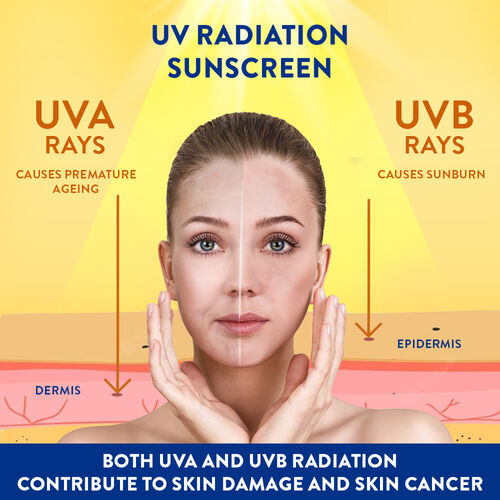
SPF 30 vs. SPF 50: Which Sunscreen Offers Better Protection?
Choosing whether to use SPF 30 or SPF 50 can be confusing, especially when both offer strong sunscreen protection. While the difference in UVB protection is small, your skin type, sun exposure, and daily routine play a big role in determining which SPF works best for you. Here’s what you need to know before picking the right sunscreen.

Understanding SPF – What Do SPF 30 and SPF 50 Mean?
SPF (Sun Protection Factor) measures how well a sunscreen safeguards your skin from UVB rays, which cause sunburn and contribute to skin cancer. The number shows how much longer you can stay in the sun without burning than unprotected skin. However, a higher SPF doesn’t mean unlimited protection—proper application and reapplication are key.
- SPF 30 blocks 97% of UVB rays, meaning if your skin usually burns in 10 minutes, SPF 30 extends that to about 300 minutes (in ideal conditions).
- SPF 50 blocks 98% of UVB rays, extending protection to about 500 minutes.
While SPF 50 offers slightly better coverage than SPF 30, no sunscreen blocks 100% of UV rays. That’s why reapplication every two hours and applying a broad-spectrum sunscreen (which also protects against UVA rays) is essential for effective sun protection.
SPF 30 vs. SPF 50 – Key Differences
Deciding between SPF 30 and SPF 50 can be confusing, but the main difference is the level of UVB protection they offer. SPF 30 blocks approximately 97% of UVB rays, while SPF 50 blocks 98%. Here’s how they compare regarding protection, reapplication, and effectiveness.
How Much UV Protection Do You Get?
- SPF 30 filters out 97% of UVB rays, making it suitable for daily wear.
- SPF 50 filters out 98% of UVB rays, offering slightly better protection.
- No sunscreen blocks 100% of UV rays, so application and reapplication matter more than the SPF number.
How Often Do You Need to Reapply?
- Both SPF 30 and SPF 50 require reapplication every two hours when outdoors.
- If you're sweating or swimming, reapply more frequently, regardless of SPF.
- SPF 30 is usually enough for indoor wear, but a broad-spectrum sunscreen is best if you're near windows or screens.
Sunscreen SPF 50 – Is It Always Better?
- SPF 50 is ideal for high sun exposure, like beach days or outdoor activities.
- For everyday use, SPF 30 is usually sufficient if applied correctly.
- Higher SPF doesn't mean all-day protection—you must still reapply and wear protective clothing.
Both SPF 30 and SPF 50 offer strong sunscreen protection, but what matters most is consistent use and proper application.
Which SPF Is Right for Your Skin Type?
Choosing the right SPF depends on your skin type, sensitivity, and amount of sun exposure. While SPF 30 is great for daily use, SPF 50 offers stronger protection, especially for fair, sensitive, or sunburn-prone skin.
A lightweight, non-greasy sunscreen is ideal if you have oily or acne-prone skin. The key is to pick a formula that suits your skin type and reapply every two hours for the best sunscreen protection. Some options that you can choose from are:
Best SPF for Daily Use
For everyday protection, SPF 30 is usually enough. It blocks 97% of UVB rays, making it suitable for indoor and moderate outdoor exposure. Look for a broad-spectrum sunscreen (which protects against UVA and UVB rays) with a lightweight texture that absorbs easily. Cetaphil Sun SPF 30+ is a good option—it’s non-greasy, water-resistant, and hydrates your skin without clogging pores.
Best SPF for Fair, Sensitive, and Sunburn-Prone Skin
If your skin burns easily or is irritated after sun exposure, go for SPF 50. It blocks 98% of UVB rays and provides extra protection against UVA rays, contributing to aging and pigmentation. Cetaphil Sun SPF 50+ is a hypoallergenic, fragrance-free option that is water-resistant and gentle on sensitive skin. It also contains vitamin E and aloe vera to soothe and hydrate.
Sunscreen for Oily and Acne-Prone Skin
Heavy sunscreens can clog pores and trigger breakouts. If you have oily or acne-prone skin, go for a gel-based sunscreen with a lightweight, non-comedogenic (won't clog pores) formula. Cetaphil Sun SPF 50+ Gel is a great choice—it absorbs quickly, doesn’t leave a greasy residue, and provides high sunscreen protection. It also helps control excess shine while keeping your skin hydrated.
Conclusion
SPF 30 and SPF 50 provide effective protection, but SPF 50 is better suited for sensitive or sunburn-prone skin. A higher SPF can reduce UV damage if you’re outdoors for long periods.
Essentially, picking the right sunscreen isn’t just about SPF—the formula matters, too. Choose one that works for your skin type, apply it every morning, and reapply as needed for the best protection. You can also use the Cetaphil AI Skin Analysis Tool to make personalized product recommendations based on your skin type.
FAQs
Is SPF 50 worth it over SPF 30?
SPF 50 is worth it over SPF 30 if you have fair, sensitive, or sunburn-prone skin. While SPF 30 blocks 97% of UVB rays, SPF 50 blocks 98%, offering slightly better protection. If you spend long hours in the sun or have skin that burns easily, SPF 50 is a better option.
Does SPF 50 last longer than SPF 30?
No, SPF 50 does not last longer than SPF 30. Both sunscreens must be reapplied every two hours or immediately after sweating or swimming. The SPF number indicates how much UVB protection it provides, not how long it lasts.
Should I wear SPF 50 every day?
Yes, you should wear SPF 50 daily if you have sensitive skin, spend a lot of time outdoors, or live in a sunny climate. While SPF 30 is usually enough for daily use, SPF 50 offers extra protection against UV rays and helps prevent premature aging, sunburn, and skin damage.
What is the best sunscreen SPF 50 for oily skin?
The best sunscreen SPF 50 for oily skin is a lightweight, gel-based, non-comedogenic formula that won’t clog pores. Cetaphil Sun SPF 50+ Gel is a great option as it absorbs quickly, provides high sunscreen protection, and helps control excess shine.
Does SPF 30 provide enough sunscreen protection for summer?
Yes, SPF 30 provides enough sunscreen protection for summer if you apply it correctly and reapply every two hours. However, if you have fair or sensitive skin or spend long hours in direct sunlight, SPF 50 is a safer choice.
Can I mix SPF 30 and SPF 50 sunscreen?
No, you should not mix SPF 30 and SPF 50 sunscreen. Mixing does not increase SPF protection—it only dilutes the formula, making it less effective. Instead, choose one sunscreen with the right SPF and apply it generously for proper coverage.




